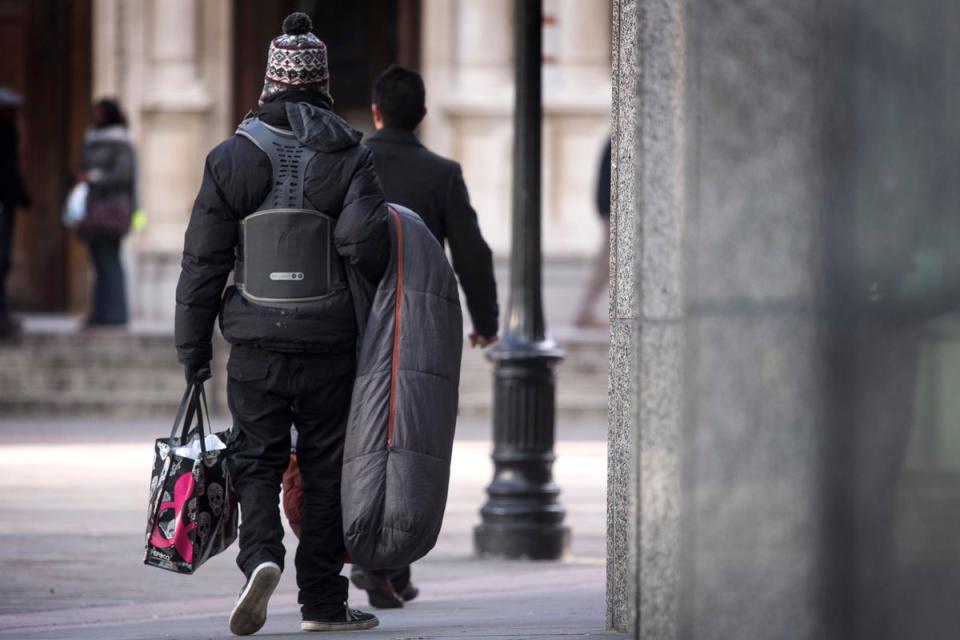More than 50,000 refugees ‘could be homeless this winter’ as Home Office speeds up evictions
More than 50,000 refugees in the UK could become homeless by the end of the year, new analysis suggests, with many already living on the streets in tents because of shrinking government support.
Refugees who are granted asylum were previously given 28 days by the Home Office to find somewhere new to live, set up a bank account, and find a job or apply for universal credit before they are kicked out of their government-funded hotel.
But some have as little as seven days because the government is delaying giving asylum seekers the documents they need to try and secure housing. A lack of affordable housing and an increase in the number of asylum grants being made is putting increasing demand on homelessness charities.
British Red Cross has estimated that 53,100 refugees will be at risk of homelessness this winter if the government clears all “legacy” asylum applications by the end of the year, as it has promised.
Even if the backlog is not cleared on time, an estimated 26,000 people could still be at risk of destitution and homelessness, the charity has warned.
Refugees are given seven days’ notice of their eviction from Home Office hotels, and cannot usually get housing support from their local authority without the letter. Councils are also prioritising families for help, leaving many single male refugees to live homeless on the street.
Since the changes at the beginning of August, British Red Cross services have seen a 140 per cent increase in destitution for refugees they support – from 132 in June and July, to 317 people in August and September.
It is now handing out sleeping bags and tents to people facing life on the streets.

Charity Refugees at Home, which matches refugees with rooms, has seen referrals increase from 70 last September to 223 last month. One Sudanese refugee, Hamad, 20, who has now been supported by the charity, had to live in a London park after he was granted refugee status in the UK and given seven days to leave his hotel.
“I thought my backpack would be stolen and I thought something bad would happen to me. There was a restaurant in Peckham where I was a regular customer – they were bringing me food when I was in the park. They said to go to a mosque in Woolwich where you will have to sweep the floor and clean the toilets, but you can sleep on the floor there. I was there [for] a couple of weeks. Then a man at the mosque told me about Refugees at Home,” he said.
He said many refugees were resorting to crime to stay alive. He said: “You are turning them out onto the street with nothing. I didn’t know about the benefits. Kicked-out asylum-seekers don’t know about that, so they have to steal. The Home Office is creating criminals by treating them like this and not telling them about the next steps after refugee status.”
Carly Whyborn, executive director of Refugees at Home, said: “Since the changes, we have had a five-fold increase in the number of referrals from refugees desperate for somewhere to live, and the situation is getting worse. We are urgently trying to reach out to new hosts, particularly in major cities, who may be able to offer a temporary place to stay.”

Frank Forman, director of Nottingham Refugee Forum, said in its last 10 drop-in sessions it had seen 60 new refugees presenting as homeless. He added: “It has been suggested that there will be over 4,000 questionnaires processed in the East Midlands by December, of which around 1,000 will be in Nottingham. The prospect of even half that number presenting to use as homeless is a challenge we are not sure how to respond to.”
Homelessness charity network NACCOM said 2022-23 was the first time since it started collecting data a decade ago that more than half the adults given help were refugees.
Alex Fraser, at British Red Cross, said: “Once people get refugee status, they need more time, not less, to find housing, work or benefits. It takes at least 35 days to start getting Universal Credit and local authorities need at least 56 days to help them find accommodation.”
A Home Office spokesperson said: “We do not recognise these forecasts. All asylum applications are considered on individual merits.
“We encourage individuals to make their onward plans as soon as possible after receiving their decision, whether that is leaving the UK following a refusal, or taking steps to integrate in the UK following a grant. We provide support for refugees to access jobs, benefits and housing.”


